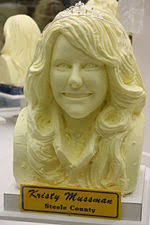 You’re not supposed to look at the image of yourself on TV while you’re on TV. You are supposed to have a facial expression other than “frozen smile melting into fear.” You’re not supposed to stare so intently at the host that it looks like you’re wondering what her hair tastes like.
You’re not supposed to look at the image of yourself on TV while you’re on TV. You are supposed to have a facial expression other than “frozen smile melting into fear.” You’re not supposed to stare so intently at the host that it looks like you’re wondering what her hair tastes like.
This is what I know about promoting your book on television, and I learned it all the hard way on Showcase Minnesota last week.
My publicist, Courtney, has been doing a fantastic job setting up media events to promote September Fair. She’s nailed numerous newspaper, radio, and television appearances, not because I’m in demand but because I have serendipitously written a murder mystery that 
But here’s the dirty secret: most of us don’t write because we like attention, and we certainly don’t like being on TV. We write because sitting in front of a computer, writing, wearing pjs so worn that the butt area is more screen than door suits us just fine. When I’m on TV, I’m not thinking deep or sparkly thoughts, and I’m not having fun. I’m hoping I don’t snart, do remember the name of either of my two children, and don’t accidentally blurt out “two city busses,” the calming mantra of my two-year-old second cousin.
It does get easier, however. A little Vaseline on my teeth so I don’t flash the snaggle-toothed smile, a couple homeopathic stage fright pills that taste like  sugar and probably are, and clothes that don’t cling, and I can stumble through an interview all right. Or not. You can be the judge. And wish me luck—I’m doing Fox Morning News and Twin Cities Live tomorrow. While you're at it, why don't you tell me what the worst/most embarassing thing you've ever seen someone do on live television is. I'll treat the information either as schadenfreude food (schadenfood!) or a slippery slope that I'm plummeting toward.
sugar and probably are, and clothes that don’t cling, and I can stumble through an interview all right. Or not. You can be the judge. And wish me luck—I’m doing Fox Morning News and Twin Cities Live tomorrow. While you're at it, why don't you tell me what the worst/most embarassing thing you've ever seen someone do on live television is. I'll treat the information either as schadenfreude food (schadenfood!) or a slippery slope that I'm plummeting toward.














 I felt somewhat vindicated back in February 2008 as I slipped the final car payment into the envelope, gave it a good lick and mailed it off. Free at last, free at last. A few weeks later, the vehicle title arrived in the mail to prove it was officially mine.
I felt somewhat vindicated back in February 2008 as I slipped the final car payment into the envelope, gave it a good lick and mailed it off. Free at last, free at last. A few weeks later, the vehicle title arrived in the mail to prove it was officially mine. 




